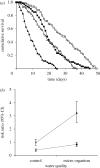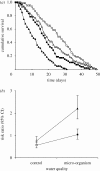Parasite virulence when the infection reduces the host immune response
- PMID: 20200031
- PMCID: PMC2871884
- DOI: 10.1098/rspb.2010.0138
Parasite virulence when the infection reduces the host immune response
Abstract
Parasite infections often induce a reduction in host immune response either because of a direct manipulation of the immune system by the parasite or because of energy depletion. Although infection-induced immunodepression can favour the establishment of the parasite within the host, a too severe immunodepression may increase the risk of infection with opportunistic pathogens, stopping the period over which the parasite can be transmitted to other hosts. Here, we explore how the risk of contracting opportunistic diseases affects the survival of the amphipod Gammarus pulex infected by the acanthocephalan Pomphorhynchus laevis. Previous work with this system has shown that upon infection, G. pulex has a substantially reduced immune response. Non-infected and P. laevis-infected hosts were maintained either in control or in micro-organism-enriched water, so as to vary the risk of encountering opportunistic pathogens. As predicted, we found that host mortality was exacerbated when infected gammarids were maintained in micro-organism-enriched water compared with clean, control water; whereas for non-infected gammarids, living in micro-organism-enriched water only moderately increased the risk of mortality. These results show that the virulence of parasites that reduce the host immune response is an environmentally sensitive trait that depends on the concomitant risk for the host of contracting opportunistic diseases. This extra source of host mortality probably represents a cost for P. laevis, and we tentatively predict that the optimal level of parasite exploitation should depend on environmental conditions.
Figures




References
-
- Benesh D. P., Valtonen E. T.2007Effects of Acanthocephalus lucii (Acanthocephala) on intermediate host survival and growth: implications for exploitation strategies. J. Parasitol. 93, 735–741 (doi:10.1645/GE-1093R.1) - DOI - PubMed
-
- Bethel W. M., Holmes J. C.1974Correlation of development of altered evasive behaviour in Gammrus lacustris (Amphipoda) harboring cystacanths of Polymorphus paradoxus (Acanthocephala) with the infectivity to the definitive host. J. Parasitol. 60, 272–274 (doi:10.2307/3278463) - DOI - PubMed
-
- Bollache L., Rigaud T., Cézilly F.2002Effects of two acanthocephalan parasites on the fecundity and pairing status of female Gammarus pulex (Crustacea: Amphipoda). J. Invertebr. Pathol. 79, 102–110 (doi:10.1016/S0022-2011(02)00027-7) - DOI - PubMed
-
- Cerenius L., Söderhäll K.2004The prophenoloxidase-activating system in invertebrates. Immunol. Rev. 198, 116–126 (doi:10.1111/j.0105-2896.2004.00116.x) - DOI - PubMed
-
- Cornet S., Franceschi N., Bauer A., Rigaud T., Moret Y.2009aImmune depression induced by acanthocephalan parasites in their intermediate crustacean host: consequences for the risk of super-infection and links with host behavioural manipulation. Int. J. Parasitol. 39, 221–229 (doi:10.1016/j.ijpara.2008.06.007) - DOI - PubMed
Publication types
MeSH terms
LinkOut - more resources
Full Text Sources
Other Literature Sources
Research Materials

